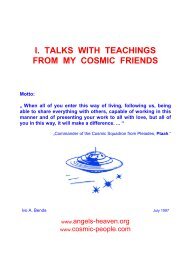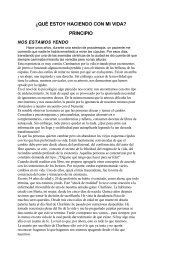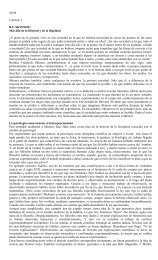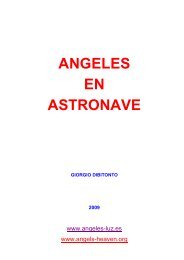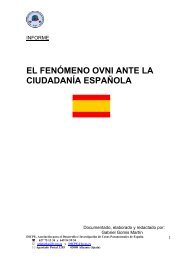The Word That is God
The Word That is God
The Word That is God
You also want an ePaper? Increase the reach of your titles
YUMPU automatically turns print PDFs into web optimized ePapers that Google loves.
<strong>is</strong> the auspicious entity where all duality ceases. He by whom Om <strong>is</strong> known, <strong>is</strong> the real sage,<br />
and not so <strong>is</strong> any other man.” (Gaudapada, Mandukya Karika 24,26-29)<br />
“When the syllable Om <strong>is</strong> known, one should not think of anything whatsoever, serving any<br />
seen or unseen purpose; for he has got all h<strong>is</strong> desires fulfilled.” (Shankara, Commentary on the<br />
Mandukya Karika)<br />
“Om <strong>is</strong> used to serve as a means to the meditation on Brahman. As other scriptures say,<br />
‘Th<strong>is</strong> <strong>is</strong> the best help (to the realization of Brahman) and the highest.’…‘One should concentrate<br />
on the Self, uttering Om.’ 106 ‘One should meditate upon the Supreme Being only through the<br />
Syllable Om.’ 107 ‘Meditate upon the Self with the help of the Syllable Om.’ 108 And so on.<br />
Although the words ‘Brahman,’ ‘Atman,’ etc. are names of Brahman, yet on the authority of<br />
the scriptures we know that Om <strong>is</strong> Its most intimate appellation. <strong>The</strong>refore it <strong>is</strong> the best<br />
means for the realization of Brahman.” (Shankara, Commentary on the Brihadaranyaka<br />
Upan<strong>is</strong>had)<br />
“Following the path of d<strong>is</strong>crimination, let the pure mind be firmly fixed in Om.” (Avadhuta<br />
Nityananda Paramhansa, Nitya Sutra 12)<br />
“Devotion, reflection, power, all three merge and become Om. <strong>The</strong> ego melts into the<br />
Omkar like camphor melts in fire.” (Avadhuta Nityananda Paramhansa, Nitya Sutra 160)<br />
“Th<strong>is</strong> mantra represents both the manifest and the unmanifest aspects of <strong>God</strong>. Om <strong>is</strong> the<br />
first sound wave that rose from the Unmanifest and <strong>is</strong> the cause of the universal<br />
manifestation–creation, preservation, and d<strong>is</strong>solution. <strong>The</strong>re are many who repeat only Om,<br />
still their minds, and realize the primeval Source of all manifestation. Through Om they reach<br />
the absolute, unmanifest Truth.” (Swami Ramdas)<br />
“Japa <strong>is</strong> repeating the Holy Name; through th<strong>is</strong> the devotee r<strong>is</strong>es to the Infinite. Th<strong>is</strong> boat<br />
of sacrifice and ceremonies <strong>is</strong> very frail, we need more than that to know Brahman, which<br />
alone <strong>is</strong> freedom. Liberty <strong>is</strong> nothing more than destruction of ignorance, and that can only go<br />
when we know Brahman. It <strong>is</strong> not necessary to go through all these ceremonials to reach the<br />
meaning of the Vedanta. Repeating Om <strong>is</strong> enough.” (Swami Vivekananda, Inspired Talks,<br />
Monday, July 8)<br />
“Do japa of Om, understanding and feeling its significance. Om <strong>is</strong> Sat-Chit-Ananda. Om <strong>is</strong><br />
Infinite. Om <strong>is</strong> Immortality. Sing Om. Meditate on Om. You will attain Self-realization.”<br />
(Sivananda, Ananda Gita)<br />
“As the various devatas are the aspects or forms of the One Supreme Being, so the<br />
various bija-aksharas or bija-mantras are so many aspects or forms of the Supreme Bija or<br />
Mantra, viz., Om.” (Sivananda, Japa Yoga)<br />
Om should always be repeated<br />
“<strong>The</strong>n he should meditate [on Om] and utter It repeatedly, more than repeatedly; for no<br />
excess here <strong>is</strong> too much.” (Amritabindu Upan<strong>is</strong>had 21)<br />
“<strong>The</strong>re <strong>is</strong> no time limit on the meditation and japa of the Pranava, but rather th<strong>is</strong> should<br />
be continued until one casts off one’s body.” (Narasingha Tapini Upan<strong>is</strong>had)<br />
“[<strong>The</strong> aspirant] shall devote himself all the time to meditation on Brahman and the<br />
Pranava, and th<strong>is</strong> way attain liberation, the state of a jivanmukta even while alive.” (Sannyasa<br />
106 Mahanarayan Upan<strong>is</strong>had 24:1<br />
107 Prashna Upan<strong>is</strong>had 5:5<br />
108 Mundaka Upan<strong>is</strong>had 2.2.6<br />
116



